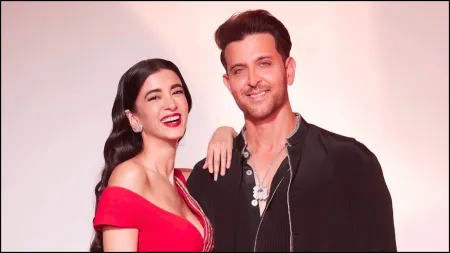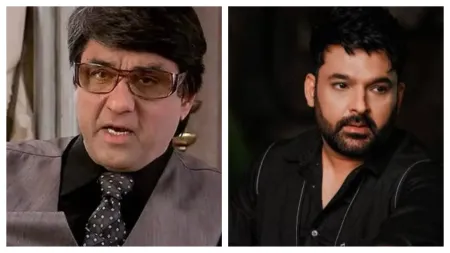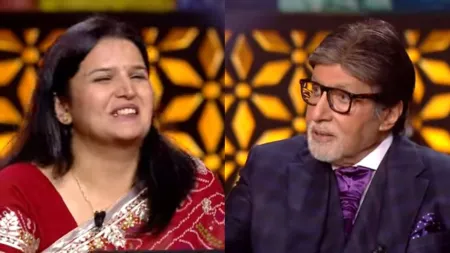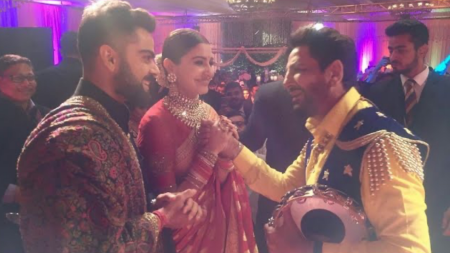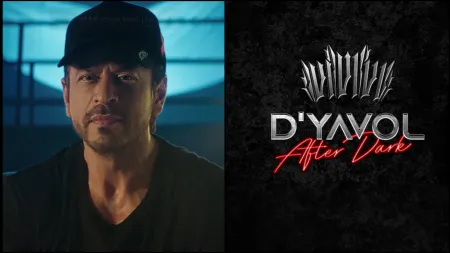In the mid-1990s, as the Malayalam film industry was mostly producing comedies and superficial family dramas, exceptional works became a rarity. Amidst this landscape, the announcement of a new project drew significant interest: with story by hit screenwriter Renji Panicker and script and dialogues penned by the legendary John Paul, director Rajeevnath, who gained recognition for his work on Aham (1992), was at its helm. The excitement surrounding the film escalated dramatically with the announcement of its lead actors — “Nadigar Thilagam” Sivaji Ganesan and Mohanlal — who were set to collaborate for the first time. Titled Swarnachamaram, the movie marked Sivaji’s return to Malayalam cinema after director Navodaya Appachan’s Thacholi Ambu (1978). Centred around two friends from different age groups, Swarnachamaram reportedly featured a climax that explored the theme of euthanasia (mercy killing). Although its soundtrack, composed by MM Keeravani, had already been released to acclaim and filming commenced in Thiruvananthapuram with several scenes completed, production was abruptly halted in less than a fortnight due to purported creative differences, ultimately leading to the project’s shelving.
Nevertheless, producer VBK Menon acted quickly, assembling another project that could be completed within the dates that Sivaji, who would have turned 96 today had he been alive, and Mohanlal had allotted him. This time, while John Paul himself was entrusted with the task of creating the script, Priyadarshan crafted the story. Meanwhile, renowned actor Prathap Pothan, who had already showcased his talent as an exceptional director with works such as Meendum Oru Kaathal Kathai (1985), Daisy (1988), Vettri Vizhaa (1989) and My Dear Marthandan (1990), was brought in as the director. Menon also managed to retain a couple of cast members, including Ranjitha and Nedumudi Venu, which allowed for a swift start to production. Despite it being a herculean task, Menon and team successfully realised the new project, titled Oru Yathramozhi, and completed it on time.

Once Upon a Time in Mollywood | Ratheesh: The Malayalam superstar whose reign lasted only a few years; but made a comeback as one of the most iconic villains
However, Menon faced further obstacles as he was unable to release the film on the anticipated date and had to wait over a year. Nevertheless, upon its release in 1997, Oru Yathramozhi received widespread acclaim and emerged as a superhit, challenging the belief that delayed projects would struggle to resonate with audiences. John Paul’s emotionally charged screenplay, coupled with “Isaignani” Ilaiyaraaja’s exceptional music and other technical elements, contributed significantly to the film’s positive reception. However, it was the performances of Sivaji and Mohanlal — both regarded among the finest actors in their respective industries and arguably across the country — that truly captivated viewers. The two legends elevated each other’s portrayals, pushing the boundaries, and enriching the movie as a whole.
Oru Yathramozhi begins with a nice shot of a railway line splitting into two, running parallel to one another. At the point of division, a lit candle stands quietly as a mute spectator to this separation. Govindankutty (Mohanlal) is a perpetual troublemaker in the locality, paying no heed to anyone and doing whatever he deems right. The first time we see Govindankutty is when he arrives at the local market in a tractor. Upon noticing him, people start running helter-skelter and in the background we hear, “Govindankutty is here, run!” With just a lever, he beats up his rivals and rescues a man who has been unlawfully detained by them. Despite this, because his sense of right and actual right are often the same, those with kind hearts are drawn to him and share a strong connection with him.
Watch Sivaji Ganesan and Mohanlal’s Oru Yathramozhi here:
John Paul’s sharp writing reveals a lot in a short amount of time. Early in the film, we learn that Govindankutty doesn’t know who his father is and that his mother Gowri (Bharathi Vishnuvardhan) is estranged from her family after conceiving a child out of wedlock. However, she remains close to her niece Nandini (Ranjitha), who is in a relationship with Govindankutty, despite their family’s disapproval. Oru Yathramozhi also subtly provides details about Govindankutty’s father who, years ago, fought the feared thug Adhruman (Thilakan) singlehandedly, underscoring that he too is a person to be feared. It is further revealed that Govindankutty’s father abandoned his mother after impregnating her, leading to her expulsion from her savarna household. Despite this, her cousin Appu (Nedumudi Venu) still cares for Gowri and her son, frequently helping Govindankutty out of trouble. Believing his father is responsible for their sufferings and the shame of being labelled a illegitimate child, Govindankutty has carried a knife for years, ready to attack him if they ever meet.
Mohanlal’s acting brilliance is fully evident in a scene where Govindankutty and Gowri are conversing and he goes through a whirlwind of emotions in a short span of time. Beginning by justifying his nature of creating troubles frequently, he then angrily lashes out at her for still caring for her family, which turns to bloodlust when he starts talking about his father, but upon seeing his mother’s sadness, his vulnerability surfaces and he tears up. The actor’s ability to navigate complex emotions with subtle facial expressions is showcased brilliantly in this scene.
Cinema Anatomy | Devara marks Janhvi Kapoor’s homecoming, as South coronated Sridevi as a Queen first and she continues to evoke strong emotions for many
Although many films have highlighted Sivaji’s greatness, Oru Yathramozhi brings something particularly special. From the moment Anantha Subramaniam aka Periyavar (Sivaji) enters, the screen lights up more, with Ilaiyaraaja’s music and Muthukumar’s cinematography emphasising his grandeur. The aura he exudes is also extraordinary. The first scene featuring both Sivaji and Mohanlal itself is immediately captivating, showcasing their mastery of dialogue delivery. As the film unfolds, their characters gradually develop a mutual fondness and Prathap Pothan’s skill in blending the energies of these two actors is flawless. At times, it even feels as though we are witnessing a real-life bond forming between Sivaji and Mohanlal, captured on camera without their knowledge and presented as a film. While both characters exude towering nature in front of others, when together, Periyavar and Govindankutty become playful, as if they’ve been lifelong friends. The song “Kaakkaala Kannamma” also highlights their remarkable chemistry.
As their bond deepens and Govindankutty comes to admire Periyavar for his many selfless acts, the film reveals a shocking truth: Anantha Subramaniam is actually Govindankutty’s father — the very man he has long sought to kill. From this point, Sivaji’s acting shines more. While Tamil actors often lean into more dramatic performances, in keeping with norms, Malayalam cinema is known for its subtlety. In Oru Yathramozhi, Sivaji embraces this subtlety, delivering a controlled yet powerful performance without losing the essence of Periyavar’s character.
Watch Oru Yathramozhi song ‘Kaakkaala Kannamma’ here:
Sivaji masterfully conveys the inner conflict of his character: revealing the truth would make Govindankutty a murderer, but staying silent would leave his son forever fatherless. His scenes with Nedumudi Venu, who plays Appu — one of the few aware of Periyavar’s true identity — are particularly compelling. Appu treats Periyavar with disgust for his betrayal of Gowri, while the latter, filled with guilt and sorrow and knowing he deserves the contempt, holds back his emotions. In the scene where Appu urges Periyavar to lie to Govindankutty that his father’s dead, Sivaji delivers certain subtle reactions which stand as a testament to why he’s called “Nadigar Thilagam”.
In the climax, set in a railway station, Sivaji and Mohanlal bring their best, each actor matching the other’s intensity in a captivating face-off. We initially see Periyavar, weighed down by guilt, looking at Govindankutty, who avoids his gaze. As he prepares to leave, having promised Appu he would send Govindankutty a letter claiming his father has died, Periyavar, overcome with emotions, finally confesses to Govindankutty that he is, in fact, his father. But Govindankutty, smiling, thanks him for “lying to extinguish his anger and desire for vengeance”. Periyavar, desperate for Govindankutty to believe him, breaks down and pleads to trust his words. Sivaji’s emotionally charged portrayal of a guilt-ridden father is matched here by Mohanlal’s calm composure, creating a powerful contrast. And finally Periyavar leaves with the realisation that he has failed to make Govindankutty believe his words.
The film ends with Govindankutty confessing to Appu that he had realised the truth about his paternity some time ago but chose denial, fearing that if Periyavar admitted it, he would lose the anger that had given his life meaning. This final revelation also underscores Mohanlal’s acting depth.
Both Periyavar and Govindankutty are characters who have sinned, un/knowingly, and each is grey-shaded in their own way. While many factors have contributed to Oru Yathramozhi’s lasting acclaim, the performances of Sivaji and Mohanlal, and their on-screen chemistry, stand out as the most significant. Credit must also go to Prathap Pothan for harnessing the potential of these two legendary actors, ensuring that neither overshadows the other, giving them equal prominence.
Disclaimer: The copyright of this article belongs to the original author. Reposting this article is solely for the purpose of information dissemination and does not constitute any investment advice. If there is any infringement, please contact us immediately. We will make corrections or deletions as necessary. Thank you.
